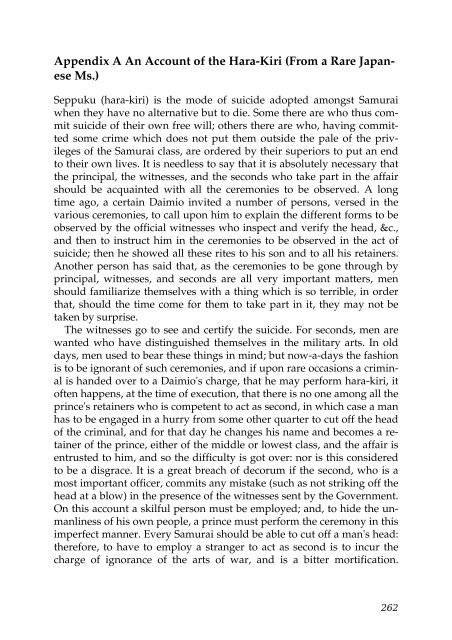Create successful ePaper yourself
Turn your PDF publications into a flip-book with our unique Google optimized e-Paper software.
Appendix A An Account <strong>of</strong> the Hara-Kiri (From a Rare <strong>Japan</strong>ese<br />
Ms.)<br />
Seppuku (hara-kiri) is the mode <strong>of</strong> suicide adopted amongst Samurai<br />
when they have no alternative but to die. Some there are who thus commit<br />
suicide <strong>of</strong> their own free will; others there are who, having committed<br />
some crime which does not put them outside the pale <strong>of</strong> the privileges<br />
<strong>of</strong> the Samurai class, are ordered by their superiors to put an end<br />
to their own lives. <strong>It</strong> is needless to say that it is absolutely necessary that<br />
the principal, the witnesses, and the seconds who take part in the affair<br />
should be acquainted with all the ceremonies to be observed. A long<br />
time ago, a certain Daimio invited a number <strong>of</strong> persons, versed in the<br />
various ceremonies, to call upon him to explain the different forms to be<br />
observed by the <strong>of</strong>ficial witnesses who inspect and verify the head, &c.,<br />
and then to instruct him in the ceremonies to be observed in the act <strong>of</strong><br />
suicide; then he showed all these rites to his son and to all his retainers.<br />
Another person has said that, as the ceremonies to be gone through by<br />
principal, witnesses, and seconds are all very important matters, men<br />
should familiarize themselves with a thing which is so terrible, in order<br />
that, should the time come for them to take part in it, they may not be<br />
taken by surprise.<br />
The witnesses go to see and certify the suicide. For seconds, men are<br />
wanted who have distinguished themselves in the military arts. In old<br />
days, men used to bear these things in mind; but now-a-days the fashion<br />
is to be ignorant <strong>of</strong> such ceremonies, and if upon rare occasions a criminal<br />
is handed over to a Daimio's charge, that he may perform hara-kiri, it<br />
<strong>of</strong>ten happens, at the time <strong>of</strong> execution, that there is no one among all the<br />
prince's retainers who is competent to act as second, in which case a man<br />
has to be engaged in a hurry from some other quarter to cut <strong>of</strong>f the head<br />
<strong>of</strong> the criminal, and for that day he changes his name and becomes a retainer<br />
<strong>of</strong> the prince, either <strong>of</strong> the middle or lowest class, and the affair is<br />
entrusted to him, and so the difficulty is got over: nor is this considered<br />
to be a disgrace. <strong>It</strong> is a great breach <strong>of</strong> decorum if the second, who is a<br />
most important <strong>of</strong>ficer, commits any mistake (such as not striking <strong>of</strong>f the<br />
head at a blow) in the presence <strong>of</strong> the witnesses sent by the Government.<br />
On this account a skilful person must be employed; and, to hide the unmanliness<br />
<strong>of</strong> his own people, a prince must perform the ceremony in this<br />
imperfect manner. Every Samurai should be able to cut <strong>of</strong>f a man's head:<br />
therefore, to have to employ a stranger to act as second is to incur the<br />
charge <strong>of</strong> ignorance <strong>of</strong> the arts <strong>of</strong> war, and is a bitter mortification.<br />
262



